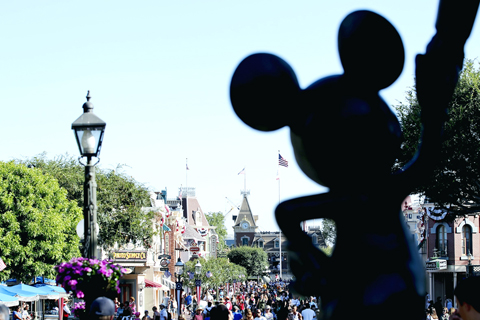The Walt Disney Co said net income for the latest quarter jumped 40 percent from a year ago thanks to a huge boost from ESPN and a turnaround at its movie studio because of Toy Story 3.
Disney said on Tuesday that fiscal third quarter net income was US$1.33 billion, or US$0.67 per share. That’s up from US$954 million, or US$0.51 per share, a year ago. Revenue rose 16 percent to US$10 billion, from US$8.6 billion.
Much of the 50 percent profit gain at its cable channels came from recognizing deferred revenue at ESPN earlier than expected, although that won’t affect the yearly results. However, advertising rates and the volume of sales at ESPN also increased.

PHOTO: BLOOMBERG
Cable channels represent Disney’s largest profit driver, and this quarter represented US$1.68 billion in segment operating profit, or about two-thirds of the total.
Ad revenue at ESPN was up 31 percent, thanks partly to carrying the soccer World Cup, and most of the earlier games in the tournament also fell in the quarter through July 3. Excluding the World Cup, ESPN ad revenue was still 17 percent higher than a year ago, besting its media company peers amid an ad market recovery.
“The 17 percent recurring growth in ESPN advertising in the quarter was the fastest amongst its peers,” Barclays Capital analyst Anthony DiClemente said. “I think that’s a big positive.”
Higher ad rates at broadcast network ABC were offset by lower ratings; its profits were only 2 percent higher.
The studio posted a much-anticipated turnaround thanks not only to the Pixar animated franchise Toy Story, but also Alice in Wonderland. Disney’s purchase of Marvel Entertainment last year also gave it an extra boost from the theatrical release of Iron Man 2 in early May. Write-downs for a couple of movies, Prince of Persia and Sorcerer’s Apprentice, pushed costs up, but the unit reversed a loss.
Profits at its theme parks fell 8 percent because of higher costs and lower attendance domestically. This month, Disney raised ticket prices by 3.8 percent for an adult day pass at Walt Disney World in Orlando, Florida, indicating a move further away from its recession-driven discounts.
Per guest spending rose 5 percent in the quarter. In contrast, when accounting for the calendar shift of the Easter holiday, domestic attendance was down just 1 percent, indicating that smaller discounts were not turning off many people.
Aside from the quarterly results, chief executive Bob Iger said Disney was attracted by the explosive growth in casual social games on the Internet, justifying the US$563 million Disney is paying for game-maker Playdom, in a deal announced last month. It could pay another US$200 million based on performance that would boost Disney’s earnings even more than that.

MORE VISITORS: The Tourism Administration said that it is seeing positive prospects in its efforts to expand the tourism market in North America and Europe Taiwan has been ranked as the cheapest place in the world to travel to this year, based on a list recommended by NerdWallet. The San Francisco-based personal finance company said that Taiwan topped the list of 16 nations it chose for budget travelers because US tourists do not need visas and travelers can easily have a good meal for less than US$10. A bus ride in Taipei costs just under US$0.50, while subway rides start at US$0.60, the firm said, adding that public transportation in Taiwan is easy to navigate. The firm also called Taiwan a “food lover’s paradise,” citing inexpensive breakfast stalls

TRADE: A mandatory declaration of origin for manufactured goods bound for the US is to take effect on May 7 to block China from exploiting Taiwan’s trade channels All products manufactured in Taiwan and exported to the US must include a signed declaration of origin starting on May 7, the Bureau of Foreign Trade announced yesterday. US President Donald Trump on April 2 imposed a 32 percent tariff on imports from Taiwan, but one week later announced a 90-day pause on its implementation. However, a universal 10 percent tariff was immediately applied to most imports from around the world. On April 12, the Trump administration further exempted computers, smartphones and semiconductors from the new tariffs. In response, President William Lai’s (賴清德) administration has introduced a series of countermeasures to support affected

CROSS-STRAIT: The vast majority of Taiwanese support maintaining the ‘status quo,’ while concern is rising about Beijing’s influence operations More than eight out of 10 Taiwanese reject Beijing’s “one country, two systems” framework for cross-strait relations, according to a survey released by the Mainland Affairs Council (MAC) on Thursday. The MAC’s latest quarterly survey found that 84.4 percent of respondents opposed Beijing’s “one country, two systems” formula for handling cross-strait relations — a figure consistent with past polling. Over the past three years, opposition to the framework has remained high, ranging from a low of 83.6 percent in April 2023 to a peak of 89.6 percent in April last year. In the most recent poll, 82.5 percent also rejected China’s

PLUGGING HOLES: The amendments would bring the legislation in line with systems found in other countries such as Japan and the US, Legislator Chen Kuan-ting said Democratic Progressive Party (DPP) Legislator Chen Kuan-ting (陳冠廷) has proposed amending national security legislation amid a spate of espionage cases. Potential gaps in security vetting procedures for personnel with access to sensitive information prompted him to propose the amendments, which would introduce changes to Article 14 of the Classified National Security Information Protection Act (國家機密保護法), Chen said yesterday. The proposal, which aims to enhance interagency vetting procedures and reduce the risk of classified information leaks, would establish a comprehensive security clearance system in Taiwan, he said. The amendment would require character and loyalty checks for civil servants and intelligence personnel prior to